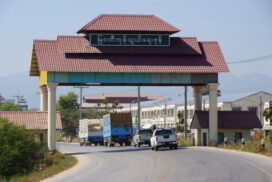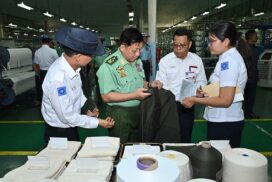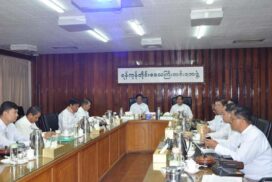Myanmar, an agro-based country, has allocated 49.39 million acres of land for cultivating various crops, including paddy, pulses and beans, oil crops, and industrial raw crop rubber. The latter is cultivated across 1.64 million acres in nine regions and states, highlighting its significance in the agricultural landscape.
Currently, Myanmar extracts latex from approximately 1 million acres of properly aged rubber plants, yielding over 300,000 tonnes of rubber annually. A substantial portion of this output, exceeding 20,000 tonnes, is utilized domestically, while the surplus—around 300,000 tonnes—is exported to international markets.
Historically, rubber plantations were limited to the Taninthayi Region and Bago mountain ranges. However, recognizing the potential, Myanmar has expanded rubber cultivation, aiming to achieve 400,000 tonnes of rubber in annual production in the near future.
Rubber holds a crucial position in Myanmar’s export strategy, contributing significantly to the national economy. In the 2018-19 financial year, rubber exports generated an annual revenue ranging from US$250-450 million. To boost export volumes, there is a concerted effort to enhance the rubber industry’s capabilities, particularly in the production of Ribbed Smoked Sheet Rubber and the systematic manufacturing of finished products derived from rubber.
Despite its strategic importance, Myanmar’s rubber industry faces challenges in quality and yield compared to regional counterparts like Thailand, Malaysia, Indonesia, and Vietnam. The local yield of 700 pounds per acre lags behind, prompting a strategic shift. Approximately 26.83 per cent of rubber plantations have transitioned to recommended high-yield rubber strains, aiming for an increased yield of 1,350 pounds per acre. This necessitates continued efforts by rubber farmers to establish new plantations with high-yield strains and budding saplings.
Myanmar has historically missed opportunities to domestically produce rubber-based goods, leading to an annual import expenditure of around US$65 million on items such as bicycle and motorbike tires and tubes. To reverse this trend, authorities must play a pivotal role in encouraging and supporting the development of rubber-based industries within the country. Such endeavours would not only reduce foreign exchange spending but also create job opportunities and contribute to overall economic development.
The emphasis on the development of Micro-, Small-, and Medium-sized Enterprises (MSMEs), reduction of foreign exchange expenditure, and the cultivation of high-quality rubber strains is imperative for Myanmar. This multifaceted approach will not only elevate the status of the rubber industry but also pave the way for the production of high-quality rubber products, fostering sustainable economic growth.
Expand cultivation of industrial raw crops to develop the State
- November 13, 2023
- 431














